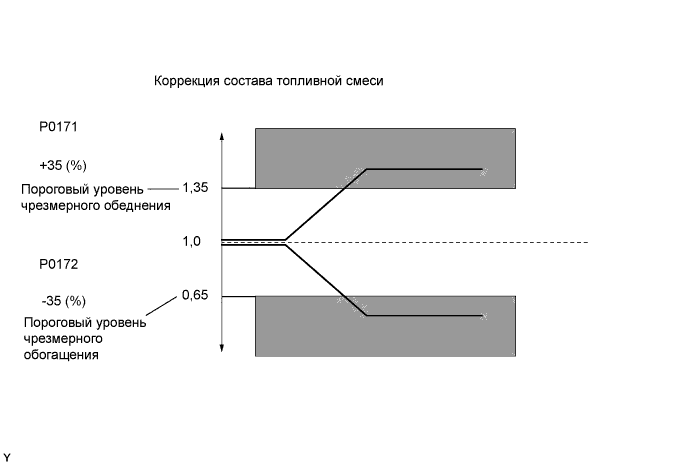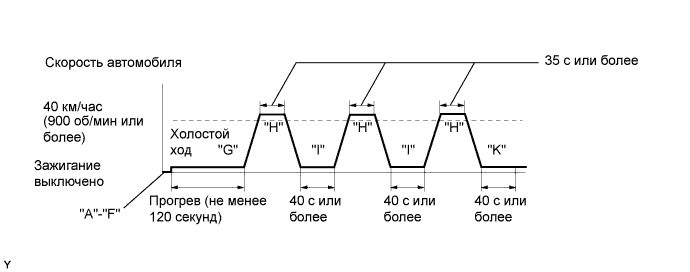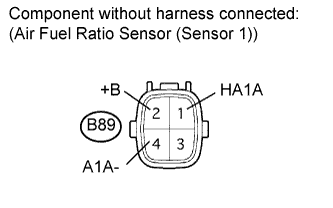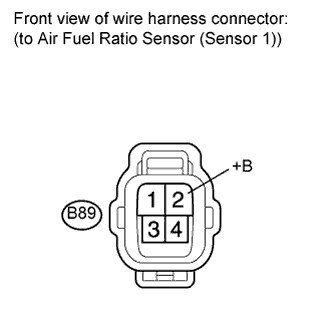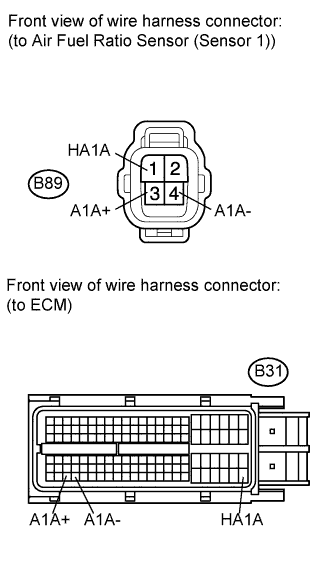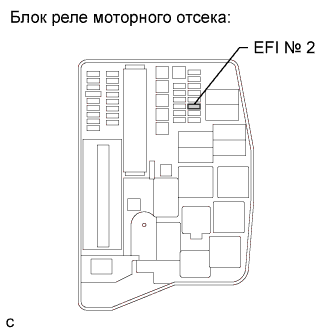Двигатель. COROLLA, AURIS. ZZE150 ZRE151,152 NDE150
DESCRIPTION
MONITOR DESCRIPTION
WIRING DIAGRAM
INSPECTION PROCEDURE
CHECK ANY OTHER DTCS OUTPUT (IN ADDITION TO DTC P0171 OR P0172)
PERFORM ACTIVE TEST USING INTELLIGENT TESTER (AIR FUEL RATIO CONTROL)
CONFIRM IF VEHICLE HAS RUN OUT OF FUEL IN PAST
PERFORM CONFIRMATION DRIVING PATTERN
CHECK WHETHER DTC OUTPUT RECURS (DTC P0171 OR P0172)
INSPECT FOR EXHAUST GAS LEAK
CHECK FUEL PRESSURE
INSPECT INJECTOR ASSEMBLY (INJECTION VOLUME)
READ VALUE USING INTELLIGENT TESTER (MASS AIR FLOW METER)
READ VALUE USING INTELLIGENT TESTER (COOLANT TEMP)
CHECK PCV HOSE CONNECTIONS
CHECK INTAKE SYSTEM
CHECK IGNITION SYSTEM
INSPECT AIR FUEL RATIO SENSOR (HEATER RESISTANCE)
CHECK AIR FUEL RATIO SENSOR (POWER SOURCE)
CHECK HARNESS AND CONNECTOR (AIR FUEL RATIO SENSOR - ECM)
REPLACE AIR FUEL RATIO SENSOR
PERFORM CONFIRMATION DRIVING PATTERN
CHECK WHETHER DTC OUTPUT RECURS (DTC P0171 OR P0172)
INSPECT FUSE (EFI NO. 2 FUSE)
CHECK FUEL LINE
DTC P0171 System Too Lean (Bank 1) |
DTC P0172 System Too Rich (Bank 1) |
DESCRIPTION
The fuel trim is related to the feedback compensation value, not to the basic injection time. The fuel trim consists of both the short-term and the long-term fuel trims.The short-term fuel trim is fuel compensation that is used to constantly maintain the air fuel ratio at stoichiometric levels. The signal from the air fuel ratio sensor (sensor 1) indicates whether the air fuel ratio is rich or lean compared to the stoichiometric ratio. This triggers a reduction in the fuel injection volume if the air fuel ratio is rich and an increase in the fuel injection volume if it is lean.Factors such as individual engine differences, wear over time, and change in operating environment cause short-term fuel trim to vary from the central value. The long-term fuel trim, which controls overall fuel compensation, compensates for long-term deviations in the fuel trim from the central value caused by the short-term fuel trim compensation.If both the short-term and long-term fuel trims are lean or rich beyond predetermined values, it is interpreted as a malfunction, and the ECM illuminates the MIL and sets a DTC.DTC No.
| DTC Detection Condition
| Trouble Area
|
P0171
| With a warm engine and stable air fuel ratio feedback, fuel trim is too lean
(2-trip detection logic)
| - Intake system
- Fuel pressure
- Injector blockage
- Mass air flow meter
- Engine coolant temperature sensor
- Gas leakage from exhaust system
- Open or short in heated oxygen sensor (sensor 1) circuit
- Air fuel ratio sensor (sensor 1)
- Air fuel ratio sensor heater (sensor 1)
- Air fuel ratio sensor heater circuits
- Ventilation hose connections
- Ventilation valve and hose
- ECM
|
P0172
| With a warm engine and stable air fuel ratio feedback, fuel trim is too rich
(2-trip detection logic)
| - Injector leakage or blockage
- Fuel pressure
- Mass air flow meter
- Engine coolant temperature sensor
- Ignition system
- Gas leakage from exhaust system
- Open or short in heated oxygen sensor (sensor 1) circuit
- Air fuel ratio sensor (sensor 1)
- Air fuel ratio sensor heater (sensor 1)
- Air fuel ratio sensor heater circuits
- Ignition system
- ECM
|
- УКАЗАНИЕ:
- When DTC P0171 is set, the actual air fuel ratio is too lean. When DTC P0172 is set, the actual air fuel ratio is too rich.
- If the vehicle runs out of fuel, the air fuel ratio is lean and DTC P0171 may be set. The MIL is then illuminated.
- When the total of the short-term and long-term fuel trim values is within 20% of the central value (and the engine coolant temperature is more than 75°C [167°F]), the system is functioning normally.
MONITOR DESCRIPTION
Under closed-loop fuel control, fuel injection volumes that deviate from those estimated by the ECM cause changes in the long-term fuel trim compensation value. The long-term fuel trim is adjusted when there are persistent deviations in the short-term fuel trim values. Deviations from the ECM's estimated fuel injection volumes also affect the average fuel trim learning value, which is a combination of the average short-term fuel trim (fuel feedback compensation value) and the average long-term fuel trim (learning value of the air fuel ratio). If the average fuel trim learning value exceeds the malfunction threshold, the ECM interprets this as a fault in the fuel system and sets a DTC.Example:The average fuel trim learning value is +35% or more or -35% or less, the ECM interprets this as a fuel system malfunction.
WIRING DIAGRAM
Refer to DTC P2195 (See page Нажмите здесь).
INSPECTION PROCEDURE
- УКАЗАНИЕ:
- Read freeze frame data using the intelligent tester. The ECM records vehicle and driving condition information as freeze frame data the moment a DTC is stored. When troubleshooting, freeze frame data can help determine if the vehicle was moving or stationary, if the engine was warmed up or not, if the air fuel ratio was lean or rich, and other data from the time the malfunction occurred.
- A low air fuel ratio sensor voltage could be caused by a rich air fuel mixture. Check for conditions that would cause the engine to run rich.
- A high air fuel ratio sensor voltage could be caused by a lean air fuel mixture. Check for conditions that would cause the engine to run lean.
| 1.CHECK ANY OTHER DTCS OUTPUT (IN ADDITION TO DTC P0171 OR P0172) |
Connect the intelligent tester to the DLC3.
Turn the ignition switch on (IG).
Turn the tester on.
Select the following menu items: Powertrain / Engine and ECT / DTC.
Read the DTCs.
- Result:
Result
| Proceed to
|
DTC P0171 or P0172 is output
| A
|
DTC P0171 or P0172 and other DTCs are output
| B
|
- УКАЗАНИЕ:
- If any DTCs other than P0171 or P0172 are output, troubleshoot those DTCs first.
| 2.PERFORM ACTIVE TEST USING INTELLIGENT TESTER (AIR FUEL RATIO CONTROL) |
Connect the intelligent tester to the DLC3.
Start the engine.
Turn the tester on.
Warm up the engine at an engine speed of 2500 rpm for approximately 90 seconds.
Select the following menu items: Powertrain / Engine and ECT / Active Test / Control the Injection Volume for A/F Sensor.
Perform the "Control the Injection Volume for A/F Sensor" operation with the engine in an idling condition (press the RIGHT or LEFT button to change the fuel injection volume).
Monitor the output voltages of the air fuel ratio sensor (sensor 1) and heated oxygen sensor (sensor 2) (AFS B1 S1 and O2S B1 S2) displayed on the tester.
- Result:
- The air fuel ratio sensor (sensor 1) reacts in accordance with increases and decreases in the fuel injection volume:
- +25% = Rich output:
- More than 3.35 V
- -12.5% = Lean output:
- Less than 3.0 V
- ПРИМЕЧАНИЕ:
- The air fuel ratio sensor (sensor 1) has an output delay of a few seconds and the heated oxygen sensor (sensor 2) has a maximum output delay of approximately 20 seconds.
Case
| A/F Sensor (Sensor 1)
Output Voltage
| HO2 Sensor (Sensor 2)
Output Voltage
| Main Suspected Trouble Area
|
1
| 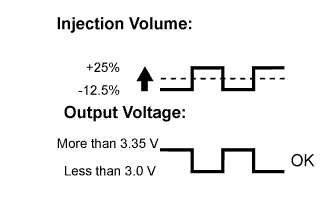
| 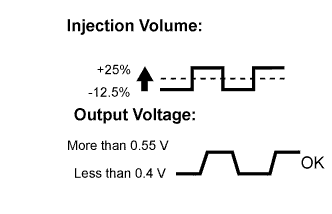
| -
|
2
| 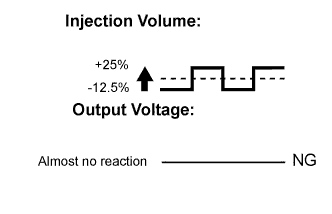
| 
| - Air fuel ratio sensor
- Air fuel ratio sensor heater
- Air fuel ratio sensor circuit
|
3
| 
| 
| - Fuel pressure
- Gas leakage from exhaust system
(Air-fuel ratio extremely lean or rich)
|
- Following the "Control the Injection Volume for A/F Sensor" procedure enables technicians to check and graph the voltage outputs of both the air fuel ratio sensor (sensor 1) and heated oxygen sensor (sensor 2).
- To display the graph, select the following menu items on the tester: Powertrain / Engine and ECT / Active Test / Control the Injection Volume for A/F Sensor / AFS B1 S1 and O2S B1 S2.
- Result:
Result
| Proceed to
|
Case 1
| A
|
Case 2
| B
|
Case 3
| C
|
| 3.CONFIRM IF VEHICLE HAS RUN OUT OF FUEL IN PAST |
Has the vehicle run out of fuel in the past?
| 4.PERFORM CONFIRMATION DRIVING PATTERN |
- УКАЗАНИЕ:
- This confirmation driving pattern is used in the "PERFORM CONFIRMATION DRIVING PATTERN" procedure of the following diagnostic troubleshooting procedure.
- (1) Connect the intelligent tester to the DLC3 (Procedure "A").
- (2) Turn the ignition switch on (IG) (Procedure "B").
- (3) Turn the tester on (Procedure "C").
- (4) Clear the DTCs (See page Нажмите здесь) (Procedure "D").
- (5) Switch the ECM from normal mode to check mode (See page Нажмите здесь) (Procedure "E").
- (6) Start the engine (Procedure "F").
- (7) Allow the engine to idle until the engine coolant temperature reaches 40°C (104°F) (Procedure "G").
- (8) Drive the vehicle at a vehicle speed of more than 40 km/h (25 mph) for 35 seconds or more (Procedure "H").
- (9) Allow the engine to idle for 40 seconds or more (Procedure "I").
- (10) Repeat procedures "G" and "H" described above at least 3 times (Procedure "J").
- (11) Allow the engine to idle for 40 seconds or more (Procedure "K").
- УКАЗАНИЕ:
- The MIL is illuminated during procedure "K" if a malfunction still exists.
- ПРИМЕЧАНИЕ:
- If the conditions in this test are not strictly followed, malfunctions may not be detected.
| 5.CHECK WHETHER DTC OUTPUT RECURS (DTC P0171 OR P0172) |
Connect the intelligent tester to the DLC3.
Turn the ignition switch on (IG).
Turn the tester on.
Select the following menu items: Powertrain / Engine and ECT / DTC.
Read the DTCs.
- Result:
Result
| Proceed to
|
DTC P0171 or P0172 is output
| A
|
DTC is not output
| B
|
| 6.INSPECT FOR EXHAUST GAS LEAK |
Check for exhaust gas leakage (See page Нажмите здесь).
- OK:
- No gas leakage.
| | REPAIR OR REPLACE EXHAUST SYSTEM |
|
|
Check the fuel pressure (See page Нажмите здесь).
| 8.INSPECT INJECTOR ASSEMBLY (INJECTION VOLUME) |
Check the injection volume (See page Нажмите здесь).
| 9.READ VALUE USING INTELLIGENT TESTER (MASS AIR FLOW METER) |
Inspect the mass air flow meter (See page Нажмите здесь).
| 10.READ VALUE USING INTELLIGENT TESTER (COOLANT TEMP) |
Connect the intelligent tester to the DLC3.
Turn the ignition switch on (IG) and turn the tester on.
Select the following menu items: Powertrain / Engine and ECT / Data List / Primary / Coolant Temp.
Read the Coolant Temp twice, when the engine is both cold and warmed up.
- Standard:
- With cold engine: Same as ambient air temperature.
With warm engine: Between 75°C and 100°C (167°F and 212°F).
| 11.CHECK PCV HOSE CONNECTIONS |
Check the ventilation hose connections (See page Нажмите здесь).
- OK:
- Ventilation hose is connected correctly and is not damaged.
| | REPAIR OR REPLACE PCV HOSE |
|
|
Check the intake system for vacuum leakage (See page Нажмите здесь).
- OK:
- No leakage from intake system.
| | REPAIR OR REPLACE INTAKE SYSTEM |
|
|
Inspect ignition system (See page Нажмите здесь).
| | REPAIR OR REPLACE IGNITION SYSTEM |
|
|
| 14.INSPECT AIR FUEL RATIO SENSOR (HEATER RESISTANCE) |
Disconnect the air fuel ratio sensor connector.
Measure the resistance according to the value(s) in the table below.
- Standard resistance:
Tester Connection
| Condition
| Specified Condition
|
B89-1 (HA1A) - B89-2 (+B)
| 20°C (68°F)
| 1.8 to 3.4 Ω
|
B89-1 (HA1A) - B89-4 (A1A-)
| Always
| 10 kΩ or higher
|
Reconnect the air fuel ratio sensor.
| 15.CHECK AIR FUEL RATIO SENSOR (POWER SOURCE) |
Disconnect the air fuel ratio sensor connector.
Turn the ignition switch on (IG).
Measure the voltage according to the value(s) in the table below.
- Standard voltage:
Tester Connection
| Switch Condition
| Specified Condition
|
B89-2 (+B) - Body ground
| Ignition switch on (IG)
| 9 to 14 V
|
Reconnect the air fuel ratio sensor connector.
| 16.CHECK HARNESS AND CONNECTOR (AIR FUEL RATIO SENSOR - ECM) |
Disconnect the air fuel ratio sensor connector.
Disconnect the ECM connector.
Measure the resistance according to the value(s) in the table below.
- Standard resistance (Check for open):
Tester Connection
| Condition
| Specified Condition
|
B89-3 (A1A+) - B31-112 (A1A+)
| Always
| Below 1 Ω
|
B89-1 (HA1A) - B31-109 (HA1A)
| Always
| Below 1 Ω
|
B89-4 (A1A-) - B31-113 (A1A-)
| Always
| Below 1 Ω
|
- Standard resistance (Check for short):
Tester Connection
| Condition
| Specified Condition
|
B89-3 (A1A+) or B31-112 (A1A+) - Body ground
| Always
| 10 kΩ or higher
|
B89-1 (HA1A) or B31-109 (HA1A) - Body ground
| Always
| 10 kΩ or higher
|
B89-4 (A1A-) or B31-113 (A1A-) - Body ground
| Always
| 10 kΩ or higher
|
Reconnect the air fuel ratio sensor connector.
Reconnect the ECM connector.
| | REPAIR OR REPLACE HARNESS OR CONNECTOR (AIR FUEL RATIO SENSOR - ECM) |
|
|
| 17.REPLACE AIR FUEL RATIO SENSOR |
Replace the air fuel ratio sensor (See page Нажмите здесь).
| 18.PERFORM CONFIRMATION DRIVING PATTERN |
- УКАЗАНИЕ:
- This confirmation driving pattern is used in the "PERFORM CONFIRMATION DRIVING PATTERN" procedure of the following diagnostic troubleshooting procedure.
- (1) Connect the intelligent tester to the DLC3 (Procedure "A").
- (2) Turn the ignition switch on (IG) (Procedure "B").
- (3) Turn the tester on (Procedure "C").
- (4) Clear the DTCs (See page Нажмите здесь) (Procedure "D").
- (5) Switch the ECM from normal mode to check mode (See page Нажмите здесь) (Procedure "E").
- (6) Start the engine (Procedure "F").
- (7) Allow the engine to idle until the engine coolant temperature reaches 40°C (104°F) (Procedure "G").
- (8) Drive the vehicle at a vehicle speed of more than 40 km/h (25 mph) for 35 seconds or more (Procedure "H").
- (9) Allow the engine to idle for 40 seconds or more (Procedure "I").
- (10) Repeat procedure "G" and "H" described above at least 3 times (Procedure "J").
- (11) Allow the engine to idle for 40 seconds or more (Procedure "K").
- УКАЗАНИЕ:
- The MIL is illuminated during procedure "K" if a malfunction still exists.
- ПРИМЕЧАНИЕ:
- If the conditions in this test are not strictly followed, malfunctions may not be detected.
| 19.CHECK WHETHER DTC OUTPUT RECURS (DTC P0171 OR P0172) |
Connect the intelligent tester to the DLC3.
Turn the ignition switch on (IG).
Turn the tester on.
Select the following menu items: Powertrain / Engine and ECT / DTC.
Read the DTCs.
- Result:
Result
| Proceed to
|
DTC is not output
| A
|
DTC P0171 or P0172 is output
| B
|
| 20.INSPECT FUSE (EFI NO. 2 FUSE) |
Remove the EFI No. 2 fuse from the engine room relay block.
Measure the resistance according to the value(s) in the table below.
- Standard resistance:
Tester Connection
| Condition
| Specified Condition
|
EFI No. 2 fuse
| Always
| Below 1 Ω
|
Reconnect the EFI No. 2 fuse.
| | REPLACE FUSE (EFI NO. 2 FUSE) |
|
|
| OK |
|
|
|
| REPAIR OR REPLACE HARNESS OR CONNECTOR (AIR FUEL RATIO SENSOR - INTEGRATION RELAY (EFI MAIN RELAY)) |
|
Check the fuel lines for leaks or blockage (See page Нажмите здесь).
- OK:
- No leaks or blockage.
| | REPAIR OR REPLACE FUEL LINE |
|
|
